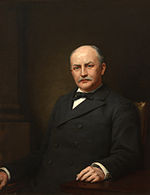United States House election, 1890
|
|
|||||||||||||||||||||||||||||||||||||||||||||||
|---|---|---|---|---|---|---|---|---|---|---|---|---|---|---|---|---|---|---|---|---|---|---|---|---|---|---|---|---|---|---|---|---|---|---|---|---|---|---|---|---|---|---|---|---|---|---|---|
|
|||||||||||||||||||||||||||||||||||||||||||||||
|
All 332 seats to the United States House of Representatives 167 seats needed for a majority |
|||||||||||||||||||||||||||||||||||||||||||||||
|
|||||||||||||||||||||||||||||||||||||||||||||||
|
|||||||||||||||||||||||||||||||||||||||||||||||
Charles Crisp
Democratic Party (United States)
Elections to the United States House of Representatives were held in 1890 for members of the 52nd Congress, taking place in the middle of President Benjamin Harrison's term.
A stagnant economy which became worse after the Panic of 1890, combined with a lack of support for then Representative William McKinley's (defeated in the election) steep tariff act, which favored large industries at the expense of consumers, led to a sharp defeat for Harrison's Republican Party, giving a large majority to the Democratic Party and presaging Harrison's defeat in 1892. The Republican-controlled Congress was highly criticized for its lavish spending, and it earned the unflattering nickname of The Billion Dollar Congress. Democrats promised to cut the outlandish budget.
Furthermore, aggressive Republican promotion of controversial English-only education laws enacted by Wisconsin and Illinois in 1889, accompanied by a surge in nativist and anti-Catholic sentiment within the state parties, had greatly hollowed out the party's support base in these former strongholds. A rare multi-confessional alliance of mainly German clergy rallied their flocks in defense of language and faith to the Democratic Party, which tore through incumbent Republican majorities in both states, capturing a total of 11 formerly Republican seats between them alone. Bitterly divisive struggles over temperance laws had also been alienating immigrants from the increasingly prohibitionist Republican Party across the Midwest more broadly. Dramatic losses in the previous year's gubernatorial elections in Iowa and Ohio (which would lose another 14 Republican congressional seats between them during this election) were due in no small part to wet immigrant communities, especially Germans, expressing their resentment toward Republican efforts to ban or otherwise curtail alcohol consumption by throwing their support behind the Democratic candidates.
...
Wikipedia



